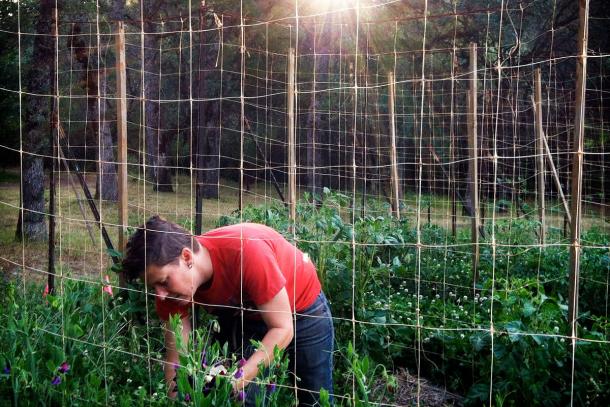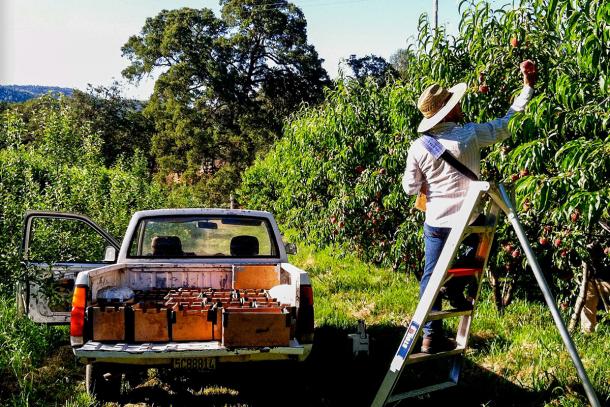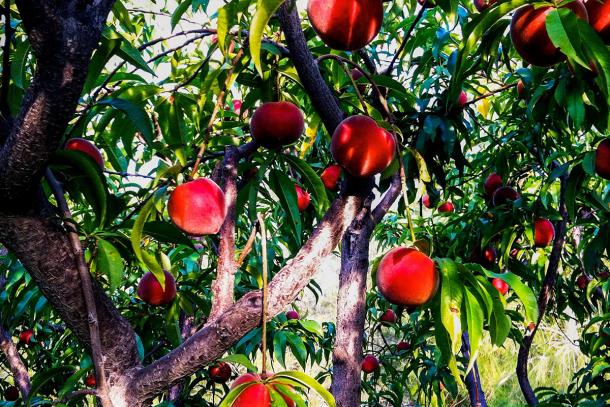New Kids on the Field: Farm Succession at Woodleaf Farm
Kayla Abe, CUESA Staff
July 8, 2016
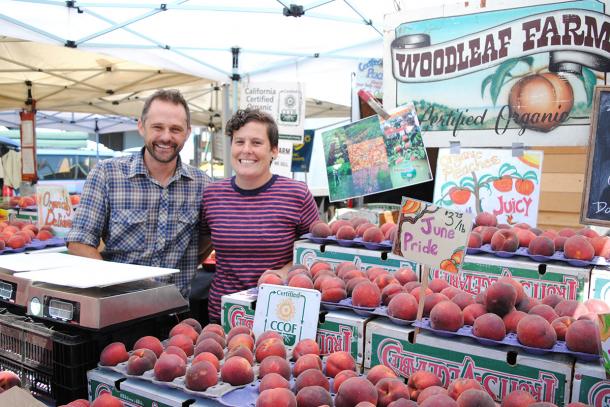
With its “wildly organic” peaches and local celebrity status as a sustainable farming pioneer, Woodleaf Farm is a much-anticipated summer highlight at Bay Area farmers markets. For more than 30 years, farmer Carl Rosato has grown deep roots at his Oroville farm, but last year he and his partner, Helen Atthowe, decided it was time to retire and pass the torch to the next generation.
“We’ve wanted to go into homesteading for years,” says Carl, “and after a year and a half of looking, we found this incredible piece of land in Wallowa, Oregon.” After placing an offer on the new property, Carl and Helen immediately began scripting a video to seek a successor.
With the average age of a farmer 58.3 years and climbing, farm succession has become an urgent concern for the future of agriculture in the United States. For Carl and Helen, it was important to find the right owners—people with a vision, youthful energy, and a deep commitment to stewardship of the soil.
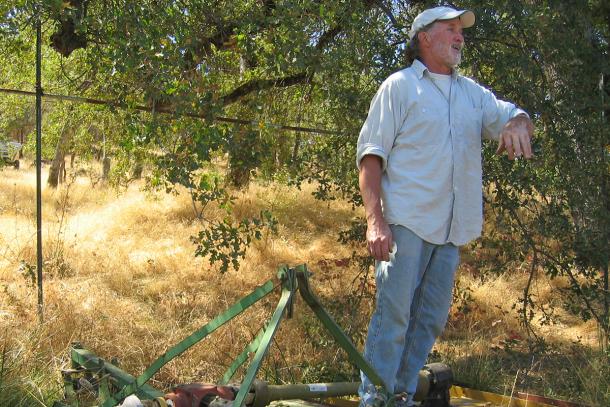
The Woodleaf Legacy
A back-to-the-lander of the 1970s, Carl founded Woodleaf Farm in the Sierra foothills in 1980, with the goal of growing flavorful, organic fruit and building balanced, fertile soil. Over the years, his reputation in the sustainable agriculture community grew as a researcher, soil consultant, and mentor for other farmers. Several years ago, he met Helen, an organic farmer from Montana who shared a similar farming philosophy and deep passion for designing sustainable ecosystems. In 2012, she sold her farm and joined him at Woodleaf.
“As hard-core environmentalists who thought the world was getting a little crowded, we didn’t have children,” explains Helen. “But as 60 loomed closer for both of us, we realized there wasn’t anyone to take over all these systems that we set up.”
Enter Danny Lazzarini and Andrew Seidman, an ambitious, young farming couple with a collective three decades of organic farm experience under their belts. For years, the couple dreamed of having their own land, and after touring the States in search of a desirable location to settle down, they came back home to California to find that Woodleaf Farm fit all their unspoken desires: an established, 26-acre farm with strong biological systems and a steadfast customer following.
Woodleaf was such a great fit that Danny and Andrew believe that, in a way, the farm found them. “We didn’t know exactly what we wanted,” admits Andrew. “But we knew that if we said no this opportunity, we would be saying no to a huge wish list of things we wanted in our lives.” Despite any obstacles, they committed to making it work.
Making Succession Feasible
The biggest barrier to entry for many young farmers is purchasing land. Coming up with a down payment is often difficult in a profession that rarely allows for significant savings. Danny and Andrew had set aside some savings during their time working together at Happy Boy Farms, but when they started looking for land, they realized it wasn’t enough. “We’re both kind of dreamers and felt like we worked really hard,” says Danny, “so we just kept looking and hoping it would somehow work out financially.”
When they serendipitously heard about the Woodleaf opportunity through a former employee of both theirs and Carl’s, they had to act fast. “Carl needed to know immediately because the winter is the one window of opportunity to sell,” explains Danny. The couple knew of grants and organizations like California FarmLink that financially support farm succession, but the immediacy of the deal did not allow them time for research.
Realizing the prospective buyers were a good fit, Carl and Helen established payment plans to make the deal as approachable as possible: they offered owner financing, and gave Danny and Andrew the option of purchasing a couple parcels up front and the rest later. They also alleviated the pressure of buying heavy machinery—another significant up-front cost—by renting their old equipment, and delayed payments until mid-season when the farmers market sales would provide some income.
In a turn of events, Andrew received financial support from his family following the passing of his father, which ultimately helped finance the purchase; however, the options presented by Carl and Helen are what initially made the deal feasible. “Getting things running would have been impossible without someone as generous as Carl with his time and resources,” states Andrew.
Adopting Two Thousand New Children
In addition to having worked at Happy Boy Farms together for 14 years, Danny and Andrew come from food-loving families with backgrounds in agriculture. But for the first time in each of their family’s histories, Danny and Andrew are pursuing farm work on their own terms. “There was no pride in farming when it was what our families had to do,” notes Andrew. “And here we are today, wanting to do it. And I can’t think of a more important, noble thing to do.”
Still, learning the nuances of Woodleaf has been a humbling experience for the seasoned farmers. They shadowed Carl at the beginning of the transition and contact him regularly under a formal consulting agreement for the first year, which also includes monthly visits to the farm. “We don’t know this place as intimately as Carl does. And having two thousand new trees to take care of is like having two thousand children,” jokes Andrew.
As with any craft, each farmer brings his or her own flair to the work, but through the transition, the couple is grateful to have mentors by their side. “This is an amazing opportunity to learn from an expert grower who is widely known and respected,” says Andrew, “and we’re going to do everything we possibly can to soak up every bit of knowledge.”
Carl is glad to see that the biological systems he’s worked to build over the past 36 years will be maintained under a similar philosophy. “We picked Danny and Drew because there was a good connection there,” says Carl. “They had a lot of previous experience, and they are committed to doing it the way we have.”
A Bright Food Future
That their goals for the future of the farm align with those of Carl and Helen’s is no coincidence. After years of cultivating a healthy farming system at Woodleaf, Carl and Helen wanted to ensure that their successors would value and nurture the sustainable systems in place at Woodleaf. “I would love to see the farm maintained both as a learning laboratory and as a place that is providing quality produce to folks in the Bay Area,” says Helen.
Danny and Andrew plan to preserve Woodleaf’s educational mission by bringing the public onto their land. “It’s a pretty special spot, and I feel like it shouldn’t just be kept for us and the few people working here,” Andrew says. Through seasonal celebrations like farm dinners and tours, they hope to demonstrate how environmental stewardship and thoughtfully grown produce are integral to a healthy food system. “It’s really important for people in the Bay Area to get out and see what these farms look like, and to see what goes into their food.”
The new owners will continue the farm’s current produce offerings, with longer-term goals of lengthening Woodleaf’s market season and introducing new crops like sour cherries and flowers.
The transition has allowed Danny and Andrew to fulfill their dream, while Carl and Helen can sleep soundly knowing Woodleaf will be cared for with the same spirit of mindfulness and vitality. Danny and Andrew realize their crucial role in carrying on Carl and Helen’s legacy of caring for the land and the local community, and are thrilled to step up to the plate.
“It’s a really important thing for me to be able to play a part in helping older farmers step away from their work, which we all know is really hard,” says Andrew. “And I think that the more these successful transitions of farms from elders to youthful farmers can happen, the better off we all will be.”
Meet Danny and Andrew of Woodleaf Farm on Saturdays at the Ferry Plaza Farmers Market. Carl and Helen now live on a homestead in Wallowa, Oregon, continuing to research sustainable farming systems. See them speak at the Soil Not Oil Conference in Richmond on Friday, August 5.
Photos by CUESA and Woodleaf Farm.
Topics: Farmers, New farmers, Organic

